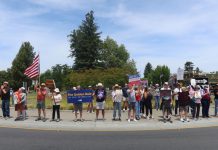
The first residents of the RV park village in Sebastopol may be living under the same roofs as they did parked on Morris Street, but are now under different circumstances. Most began arriving Tuesday, Feb. 15 to join the city’s year-long pilot program run by Sonoma Applied Village Services to support their transition into more stable housing.
While many residents stayed in their vehicles, Resident Manager Ben Peterson motioned to “people of all trades” setting about the property to put up infrastructure, from electric trenching and sewer connections to building a fence around the village.
Peterson found himself “happy and tired” running around as people moved in. The city inspector had visited that morning and it was pretty hectic on the scene, “but it’s nothing that can’t be done,” he said.
The resident manager noticed immense relief among residents, glad to be off Morris Street across the Barlow and away from law enforcement eyeballing expired vehicle registrations. Newcomers received packets to fill out upon arrival and soon there would be a tent where people could sit and eat food, said Program Manager Hector Gutierrez.
He anticipated 18 formerly homeless individuals to take up residence in the village beside Gravenstein Highway North. Some moved in early because police were preparing to relocate them or otherwise address parking or registration-related infractions, according to Peterson.
The managers and workers labored around the electrical trenches to help haul trailers in. Some require specific towing services, Gutierrez said. On-site were SAVS outreach workers and caseworkers, a couple people delivering dinners on behalf of their organizations and a number of portable toilets.
That day, workers shoveled gravel and measured RV stalls where people could park trailers and vehicles. “It’s fun, kind of a rush to be under so much pressure,” Peterson said.
But not all of the pressure is positive. Gutierrez described people shouting from cars, harassing him and contending that the village is already ruining the neighborhood. The two managers fielded questions and complaints from residents and members of the public alike Tuesday. Still, he said, a different neighborhood committee has encouraged the project.
And of course, the village had support from the Trash Trolls, a couple fiscally sponsored by West County Community Services to provide trash removal services for homeless people in the Lower Russian River. Keary and Sally Sorenson were hired to make dump runs from the village twice a week, Mondays and Fridays.
They know a thing or two about what the park’s opening could mean for Sebastopol’s homeless community, as formerly unsheltered individuals themselves. It took years for the pair to overcome meth addiction and years to get stable housing.
Keary said he and his wife didn’t realize how stressed they were, “scrounging for pennies, doing anything and everything for money to avoid homelessness” until after they moved into a stable living arrangement.
Friends told them they were laughing more instead of bickering and fighting. They slept better, but they were so used to running on adrenaline that it took a while for their bodies to calm down, he said.
As he spoke, a sleek black car laid on the horn passing the site. The same car passed the village on its way back not long after, again blaring its horn. Actions like that, Keary said, increase the mental stress of homeless people and does not encourage their journey finding a way out.
“This is step one. The mental healing begins,” he continued beside his truck. “The stress of being a mole in a whack-a-mole game is slowly going to go away.”
Keary bet it would be months until residents stopped hunting for water bottles. At the RV park, people have access to running water and electricity, which means heaters and fridges. Streetside and without adequate shelter, people have to contend with “the warmth of the atmosphere” and animals trying to steal their food.
He said the RV park village was a better solution than temporary shelters he described as havens for COVID-19 and imagined a place with more resources, like a one-chair dental office and other small clinics, a visiting vet tech and a mechanic to support people ready to move out but can’t until their RV is fixed.
“You don’t know how exciting this is for us. We’ve been for this for 30 damn years,” Keary said. “I look at this and I feel like crying,” he added later, calling the RV Park Village a dream come true and history in the making.








